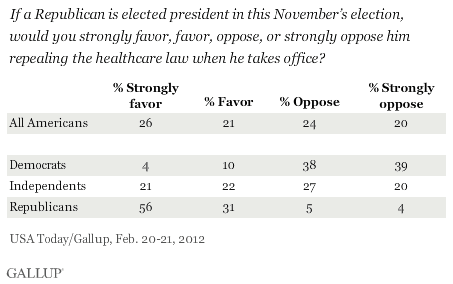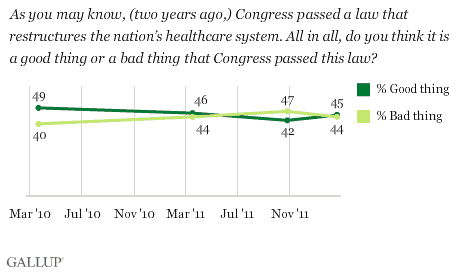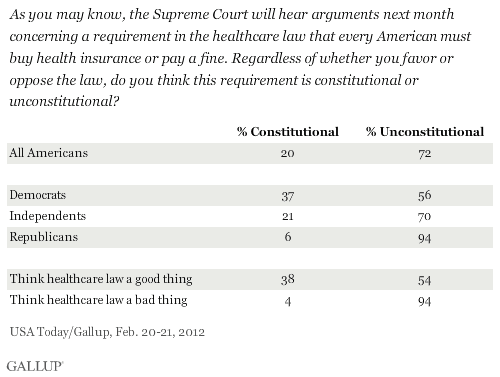PRINCETON, NJ -- Americans divide evenly when asked if they favor (47%) or oppose (44%) a Republican president's repealing the 2010 healthcare law if elected this November. Republicans overwhelmingly favor repeal (87%) and Democrats overwhelmingly oppose it (77%). However, Republicans hold their views much more intensely than Democrats, with 56% of Republicans strongly favoring repeal and 39% of Democrats strongly opposing it.

Thus, a Republican president would have a clear mandate from his own party's supporters to attempt to overturn the law, as all of the Republican candidates have vowed to do if elected. However, such a position may turn off about as many independent voters as it attracts.
Americans are also split in their basic views of whether Congress' passing the law was a good (45%) or a bad thing (44%). This has generally been the case ever since the law was passed, though opinion tilted slightly more positive immediately after its passage and slightly more negative last fall, when Americans' economic confidence was low.

A few provisions of the healthcare law have already gone into effect, though it will not be fully implemented until later this decade, if it survives an upcoming challenge in the U.S. Supreme Court. To date, 7 in 10 Americans say the law has not had an effect on them personally, with about equal proportions saying it has helped (12%) or hurt (16%) them.
Americans are less optimistic that the law will improve their family's healthcare situation in the long run, however. Thirty-eight percent expect the law to make their situation worse, compared with 24% who say better. Thirty-four percent do not expect it to make much difference.
Not surprisingly given their opposition to the law, Republicans hold a dim view of the law's prospects for their own healthcare. Sixty-eight percent of Republicans think the law will make their own healthcare situation worse, compared with 3% saying better. Democrats are fairly evenly split as to whether the law will improve their healthcare situation or not make much difference, while independents do not exhibit much consensus on the law's likely impact.
![Now suppose all of the provisions of the healthcare law go into effect in the next few years. In the long run, how do you think the healthcare law would affect your family’s healthcare situation? Would it -- [ROTATED: make things better, not make much difference, (or would it) make things worse]? Among all Americans and by party ID, February 2012](http://content.gallup.com/origin/gallupinc/GallupSpaces/Production/Cms/POLL/jetseeed5eufod9o07th1w.gif)
Americans Do Not Think Individual Mandate Passes Legal Muster
The Supreme Court next month will hear legal challenges to the healthcare law, which are focused on the law's requirement that all Americans purchase health insurance or pay a fine. Americans overwhelmingly believe the "individual mandate," as it is often called, is unconstitutional, by a margin of 72% to 20%.
Even a majority of Democrats, and a majority of those who think the healthcare law is a good thing, believe that provision is unconstitutional.

A series of lower-court rulings have so far disagreed as to whether the provision violates the Constitution.
Implications
The Patient Protection and Affordable Care Act of 2010 law has been arguably President Obama's most significant legislative achievement to date. Yet Americans have not shown clear majority support for it, before or after its passage. Rather, they have generally been divided, likely because Republicans' overwhelming opposition has counterbalanced Democrats' overwhelming support for it.
It is not clear that public support for the legislation will increase as long as Republican leaders and rank-and-file Republicans remain steadfastly opposed.
The law's fate remains very much in question even before it is fully implemented, due to legal challenges and some elected officials' desire to work to repeal or otherwise not implement the law.
To date, few Americans report any effect of the law on their own healthcare situation, though that would likely change in the coming years if the law is implemented as planned. If this happens, Americans' opinions could shift, depending on whether the law benefits or harms them personally, and whether they perceive it to improve the broader U.S. healthcare system or to make it worse.
Survey Methods
Results for this USA Today/Gallup poll are based on telephone interviews conducted Feb. 20-21, 2012, on the Gallup Daily tracking survey, with a random sample of 1,040 adults, aged 18 and older, living in all 50 U.S. states and the District of Columbia.
For results based on the total sample of national adults, one can say with 95% confidence that the maximum margin of sampling error is ±4 percentage points.
Interviews are conducted with respondents on landline telephones and cellular phones, with interviews conducted in Spanish for respondents who are primarily Spanish-speaking. Each sample includes a minimum quota of 400 cell phone respondents and 600 landline respondents per 1,000 national adults, with additional minimum quotas among landline respondents by region. Landline telephone numbers are chosen at random among listed telephone numbers. Cell phone numbers are selected using random-digit-dial methods. Landline respondents are chosen at random within each household on the basis of which member had the most recent birthday.
Samples are weighted by gender, age, race, Hispanic ethnicity, education, region, adults in the household, and phone status (cell phone only/landline only/both, cell phone mostly, and having an unlisted landline number). Demographic weighting targets are based on the March 2011 Current Population Survey figures for the aged 18 and older non-institutionalized population living in U.S. telephone households. All reported margins of sampling error include the computed design effects for weighting and sample design.
The questions reported here were asked of a random half-sample of respondents for two nights on the Gallup Daily tracking survey.
In addition to sampling error, question wording and practical difficulties in conducting surveys can introduce error or bias into the findings of public opinion polls.
View methodology, full question results, and trend data.
For more details on Gallup's polling methodology, visit www.gallup.com.
